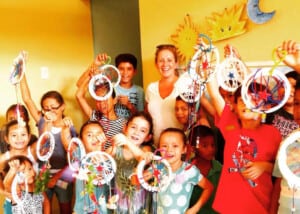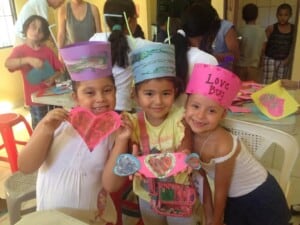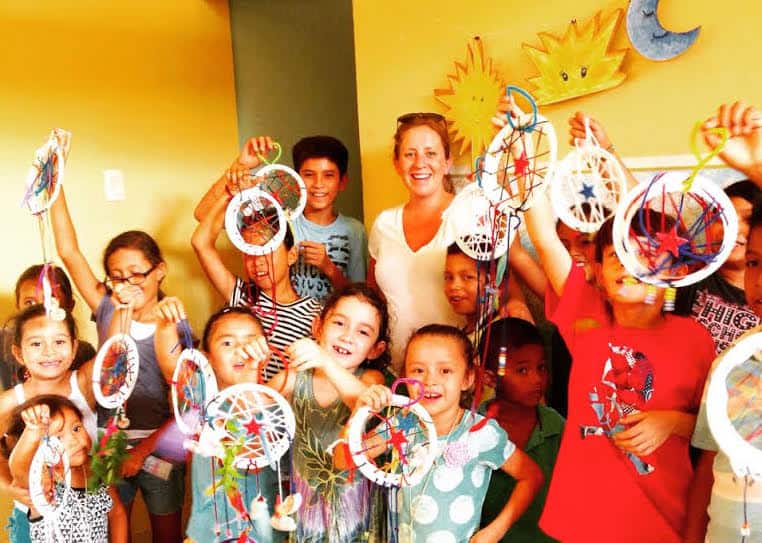When Aliya Rosenbloom applied to The University of Texas School of Social Work for her master’s degree, she knew she knew she wanted to study abroad. Rosenbloom, who graduated with a Master’s of Science in Social Work this past May, told us about her final field placement in Playa Potrero, Costa Rica, and the impact it had on her as a social worker.
Where was your field placement in Costa Rica?
It was at a nonprofit called Abriendo Mentes (Opening minds) in Playa Potrero, on the northwest coast. It was my third-year field placement from January through June. They were doing a lot of things I wanted to do there, like starting a garden and teaching kids, but also working with adults. I really aligned with their mission: to empower the community to empower themselves. Plus, I wanted to improve my Spanish. Overall, my greatest purpose is to help people help themselves and they did just that.
What kind of projects were you involved in?

I taught English: an advanced English class and a high school class. That was a big stretch for me because I’d never taught English…The kids hadn’t had a successful colegio class in years. By the time I left, I had 13 high school students who came after school to my class. It was free for kids and adults paid the equivalent of 4 dollars. The classes were a half hour once a week for kids and an hour twice a week for adults.
I also hosted several professional development training workshops for the staff of Abriendo Mentes. I did one for workplace motivation and another about personality differences when working as a team. That was empowering for me. I generally like to teach, but it aligned with the goal of helping people help themselves.
I also generated ideas and found funding resources. One of my good friends works for the Regional Foundation Library, a non-profit in town that offers a grant database. I emailed her asking for access. Abriendo Mentes is a US non-profit in a Costa Rican community, but because the base is in Austin, she was able to grant us access to use the database while I was abroad. I also found a website that mapped out every grant that was given to a Costa Rican non-profit in the past ten years.
And I started teaching yoga there last summer. A woman I became close with, Colleen, worked with an organization called Cepia. I first created a script for myself to teach yoga and after 5 weeks, she pulled the script away and I was on my own. That was probably the most beautiful thing there. It was incredibly empowering for me – what yoga is and what it doesn’t have to be.

How did this project train you as a social worker?
The ethics of social work were key. You have the NASW perspective, your organization’s perspective, a cultural perspective and then your own ethics and values. You have to operate from all of that. The experience in Costa Rica really taught me to be fluid and flexible and challenge my own ideals. The adaptability you learn from situations like that, you just can’t learn that any other way. I call it “the pressure curve”. You’re thrown in and it cooks you really fast. Maybe I wasn’t there to create a whole new foundation, but to plant seeds instead. And those seeds may not be harvested for years. That’s the beauty and the struggle of our work. It’s a lot of faith and planting seeds, hoping they make fruit and trusting the process.
What kinds of skills did you pick up in your classes at the School of Social Work that helped you abroad?
I noticed a gap in what the nonprofit said its purpose was and the way we were getting there, so I thought it would be helpful to look at the organization from a bird’s eye point of view. To do that, I developed a logic model, which was a tool I learned during my last semester in grad school. It broke down the organization in terms of inputs and outputs. Inputs are activities that the organization performs, such as English classes, community engagement and social events. Outputs are what we create, like safety in the community, and a place where people can congregate. It was really useful for the organization to see how our goals were met by the activities we were doing. We didn’t want to do activities frivolously, or just because we thought it was what was best.
What are you doing now?
I am currently working for the Amala Foundation. We unite youth from all walks of life to come together and celebrate their humanity and diversity. Our program is the Global Youth Peace Summit and we bring together teenage youth from 30 countries for eight days. This will be the first year there will be three peace summits. The first was in California in mid-June, the second one is in August, and the third one is in Kenya in December, the first international summit. I’m contracted with Amala until September. I’ve worked there for three years in various roles. I interned my first year in school in addition to classes and my field placement…I also teach yoga and I’m starting to work with Community Yoga Austin.
Why are field placements abroad beneficial to social workers training for their careers?
I truly believe that if an employer is going to look at your resume next to someone else’s, international placements speak volumes. Your willingness to be vulnerable and take risks, to be scared and do it anyway, to have courage, to learn in intensive environments – it makes all the difference.
Posted July 29, 2015. By Paepin Goff.


